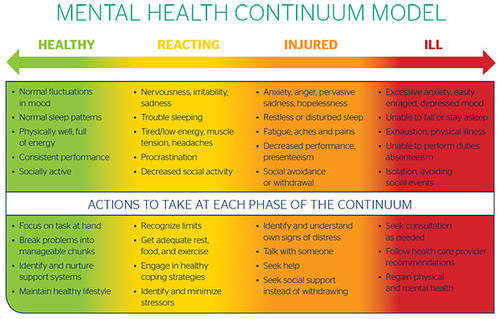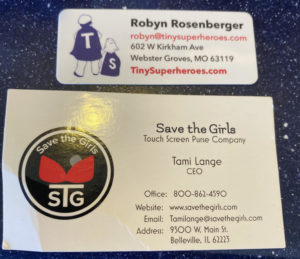Managing Your Mental Health in Turbulent Times
"You still need care and attention to perform at your best, or you will definitely crash and burn.” - Double your Resilience, Your Oxygen Mask First
Wow. What a week! We went from watching problems far away in Asia and Europe to finding ourselves in the middle of the same virus storm, at home.
We are watching history in the making and it’s fascinating - and stressful. We’re all worried about people we care about getting sick. And, like many of you, I’ve prepared for the possibility of a home quarantine.
I learned from my mentor Thomas Leonard about the Principle of Super Reserve: having much more than you need of the resources you need – time, money and support (and toilet paper, which some have taken to an extreme!) – so that you are able to be present and to do your best work.
No matter how smart, strong or capable, it’s easy to be affected by the fear that kicks in when society as a whole is having a panic attack.
Because of all I’ve learned over the years, I recognize when my mindset changes and know how to quickly bounce back. After such a stressful week - as I worked with clients throughout North America, Europe and Asia through some very challenging situations; and as the pandemic moved across the globe – I’m getting back to the resilience rituals (getting outdoors and writing) that make me feel dramatically better. I can now focus on what I need to do, in my own world, and to help others better. It makes a massive difference.
So, here are my recommendations for you:
- Look at the Mental Health Continuum Model to self-assess and understand your current mental health. The spectrum from Healthy to Reacting to Injured or Ill – from red to green)
- Read or review Chapter 3 on Resilience Rituals and make sure you’re doing everything you can to take care of yourself.
- Talk to someone if the stress is getting to you to shift your mind from watching what’s happening to what you can do. Staying in victim mode can be paralyzing, and the sooner you can get into action, the better
- Take care of the practical issues and think about you can do beyond the situation to enjoy your life – to make quality connections and time with family and friends.

Image Source: BC Emergency Health Services
It should be the same with your companies: make sure you are prepared to withstand the turbulence, and in a position to do the right thing for your customers and your employees.
It’s a time to look for opportunities not problems, to scrape away all unnecessary projects and to become more efficient.
It’s a time for action.
The Challenge
- What do you have to do for you and your family to free yourself up to do your best work?
- What are the biggest opportunities for your company now?
If you need help to navigate this stormy time, please reach out. We’re here to help.
Channeling Entrepreneurial Energy
“Expanding your mind in seemingly random areas of interest is more than just personally satisfying. It causes synapses to fire, sparks creative ways of thinking, and it's guaranteed to make you a better leader.” - Learn Like Your Life Depends on It, Your Oxygen Mask First
I met some really inspiring entrepreneurs last Thursday, when I spoke to members of Entrepreneurs’ Organization (EO) in St, Louis, Missouri, about the principles of building a team full of A-players, and how to stay strong and resilient.
I love hearing people's stories and the ideas that inspire them to start their own successful business.
 For one member, it was her sister’s battle with breast cancer that inspired a line of Cell Phone Touch Screen Purses – a business that is now exploding with success.
For one member, it was her sister’s battle with breast cancer that inspired a line of Cell Phone Touch Screen Purses – a business that is now exploding with success.
Another member started an organization to provide superhero capes to kids to help them to overcome a disability, illness or challenge. This idea was so inspiring - and I plan to personally support what they’re doing.
And another created a marketing agency that gets so deeply involved, they go beyond lead generation and marketing, and actually work to improve their clients’ company processes to ensure their success.
It’s very powerful to get out of the office and meet different entrepreneurs. Hearing about creative new approaches and innovations in grassroots organizations builds excitement. When we’re so busy, it’s easy – and limiting – to only spend time with the same people, in the same environments.
Get out there and meet people, listen, look and learn. Share ideas, perspectives and insights. You’ll find every shape and size - and motivation and inspiration. All of them will help you to channel your entrepreneurial energy. And you will see the world, your business, and your life, differently.
The Challenge
- Meet with new entrepreneurs and leaders to learn about fresh and diverse approaches to solving problems.
Superhero School
“Build a team that delivers better results than you, without you.” - Chapter 10, Your Oxygen Mask First
I have the great fortune to work with many CEOs and executives who are seen in the same light as superheroes. They are smart, driven, solid people who have the ability to solve challenging problems and create incredible results when it matters most.
We idolize the superheroes in our culture. The athlete, the CEO or executive with an outstanding record of success. The working parent who raises a family, thrives in their career and contributes to the community.
They are role models for excellence and the capability of the human spirit, and all of us can be inspired by what they create.
The downside is that we mistakenly believe that success only looks like a solitary, motivated person who works hard to make a difference in the world. But, sooner or later, these superheroes hit a ceiling because one person can only do so much.
Superhero Syndrome
I worked with an amazing executive – a guy who could make things happen like I’ve never seen.
He was the best of the best – and even had the Superman cufflinks to his match his persona. He had a large team but kept maxing out because he thought he was the superhero. The person who had to carry the weight of the world on his shoulders.
After seriously burning out for the third time, we worked on how he could do things differently. And I got him to clearly see that his job wasn’t to do it all. It was to build team of superheroes who could earn their own their superhero accessories. He needed to switch his energy to how the people on his team could grow their powers.
I got through to him using the metaphor of parenting. He could be the best dad ever to his kids, but they wouldn’t be the best version of themselves and strong, capable adults if he did everything for them. His job, as a parent, was to make them strong, independent, and equally or more capable than him.
He got it and, within a couple of years, had built a team of superheroes who were just crushing all their projects and creating legendary achievements of their own.
The Challenge
- Where do you notice that you (or someone on your team) are stuck in the mindset of being a superhero?
- What can you do to shift that and put the energy into building a team of superheroes?
PS – For more insight - and some practical techniques - read Chapter 10 of my book, Make Yourself Useless.
Problem Solving Logic Can Be Dangerous
“Make people think for themselves and they’ll get better at it.” - Your Oxygen Mask First
When it comes to a business issue, problem solving logic tells us that it needs to be solved but, sometimes, it’s better to leave it alone. We can get so caught up jumping in to find a solution that we lose sight about what can have the biggest impact on our project or business.
There are two questions to ask:
1. Does the problem actually need to be solved?
For example: A problem may be a 25¢ issue with a 25¢ downside (zero risk). Don't get consumed with the issue when there’s a $50,000 opportunity you can work on for one of your customers.
Problem solving logic makes the issue seem important and seductive, a fire you want to put out. If it’s close to people’s homes, of course you need to take care of it, but, in reality, some fires just need to burn themselves out.
If you take care of every little problem, you’ll have a neat, orderly small business. If you want to grow and progress, you have to pick your problems.
2. Do I need to be involved?
As a leader, your role is to make sure people are clear on their priorities, and to support them when they need help. Solving a problem can be very satisfying but if you do all the thinking, you will underutilize your team.
Your role is to grow and develop people into being more capable. Get them to find a solution or get back to you with options.
The Challenge
- What 25¢ problems are you and your team currently putting energy into?
- Are you involved in a problem or opportunity that doesn't really need your attention? Think of these as great opportunities for someone on your team.
- On the flip side, what problems or opportunities should you be more involved in?
If you’re not sure, review Chapter 12, Stop Being Chief Problem Solver in my book.
Playing it Safe
“We don’t stop playing because we grow old. We grow old because we stop playing.” - George Bernard Shaw
Are you playing it safe and holding back from the things you’d like to do? Have you ever asked yourself why?
I find a lot of people come to a point where they live their lives too safely, who limit themselves by not trying anything new. I’m fascinated why some people lose their curiosity in their 30s and 40s while others continue to expand their lives and experience new things in their 70s and 80s.
I’m an adventurer at heart and come by it honestly. In fact, my late grandmother Betty Howatt inspired Keep Going for It, Chapter 16 of Your Oxygen Mask First. She lived her life out loud, even going back to university at age 81 because she was curious about the religions of the world.
Because I was born with the ‘explore DNA’, I’m always inspired by people who aren't playing it safe and continue to push themselves, like:
- A friend who went back to University to study biology because he was curious about the brain
- An entrepreneur I work with who, in his 70s, still skis 40 to 50 days a year, and is one of the keenest learners in our Leadership Education sessions
- A colleague who studied fine art, in her late 50s.
Everyone is different, and there’s no right or wrong - unless your brain and body are stagnating, and you’re not taking steps to get what you really want.
I’ve found that the more I face the discomfort of pushing myself to learn something new, the more confidence I gain. Try it! You’ll see its contagion spread to every area of your life.
The Challenge
- Where are you to taking steps to expand your horizons?
- Where are you holding back and why?
- What’s one step can you take today to move forward and stretch yourself?
If you want some inspiration, read Chapter 16 of Your Oxygen Mask First or check out this video: Keep Going for It.
Genius on Tap: What Makes a Good Mentor?
“Get yourself a whole bunch of genius on tap, even if you only access it now and again.” - Quadruple Your IQ, Your Oxygen Mask First
I was talking to a colleague this morning in preparation for some work on my new book. We talked about a time when he had hit a really rough patch in his career and felt lost, with no idea what to do. He was transitioning from one business to another and there were a lot of decisions and challenges to work through.
I asked what had worked for him – or not – and he talked about a mentor who had helped him to work through everything.
Unfortunately, many of the supportive people closest to us many not be the best choice because they can get very excited and passionate and protective. It’s not right or wrong, but they are often too close to have perspective, and may not have the skill sets and experience and we need
Throughout my life, coaches and mentors have been most valuable when I’ve been in change and transition - either of my choosing or forced on me – and I’ve found their experience incredibly valuable. It’s been fascinating and eye-opening to see the number of external advisors, coaches and consultants that the high-performers I’ve worked with over 25 years use to help them with different situations.
What makes a good Mentor, coach, or advisor?
It’s a very personal question because it’s not necessarily someone who has a specific personality type, designation or training. When you have a massive opportunity to capitalize on, or are challenged by a massive obstacle, you need someone with the wisdom of ‘been there, done that” to tap into, to give you the clarity you need to push ahead and to get what you want.
And, it’s someone who is a good match for you – someone who can work and communicate in a way that allows you to easily get what you need and to move ahead.
The Challenge
- What advisor, consultant or mentor would be most helpful to you right now?
- The Expert Scorecard on pages 155 and 156 in Quadruple Your IQ, Chapter 11 of my book can help you to evaluate your current advisors and identify one you may need.
And, if you need help finding someone to help you, let us know. We have a number of different people, with different experience, on our team and know many other experts around the world.





